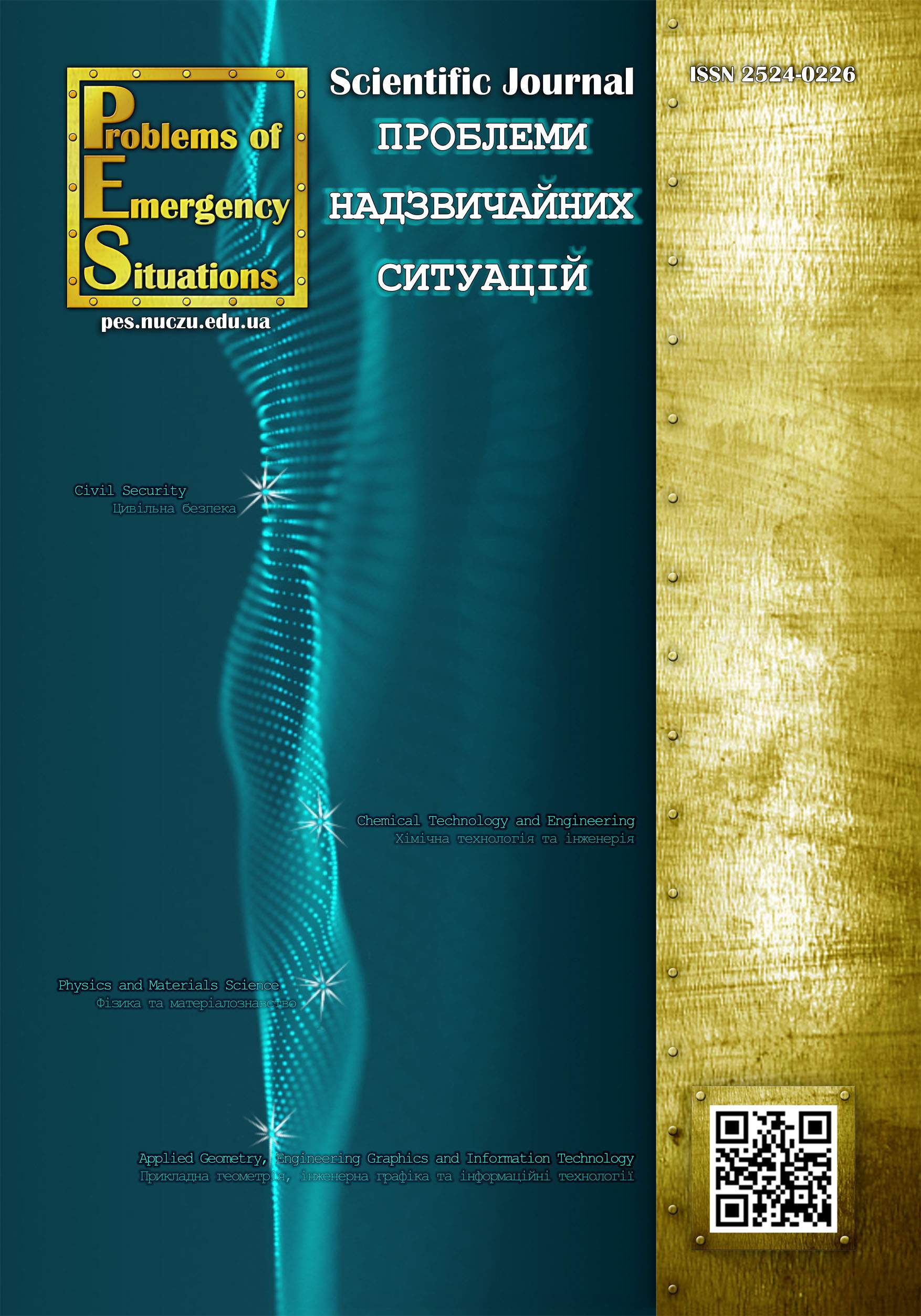Silicophosphate fireproof coatings for building materials
Lysak Nataliia
National University of Civil Defenсe of Ukraine
https://orcid.org/0000-0001-5338-4704
Skorodumova Olga
National University of Civil Defenсe of Ukraine
https://orcid.org/0000-0002-8962-0155
Chernukha Anton
National University of Civil Defenсe of Ukraine
https://orcid.org/0000-0002-0365-3205
Goncharenko Yana
National University of Civil Defenсe of Ukraine
https://orcid.org/0000-0002-1766-3244
Melezhуk Roman
National University of Civil Defenсe of Ukraine
http://orcid.org/0000-0001-6425-4147
DOI: https://doi.org/10.52363/2524-0226-2024-39-19
Keywords: fire-resistant coatings, building materials, liquid glass, SiO2 sol, phosphate buffer solution, fire resistance
Аnnotation
The composition of silicophosphate fire-resistant coatings for wooden building structures was developed and their properties were investigated. Fireproof compositions were obtained by mixing aqueous solutions of liquid glass and acetic acid. As a phosphate-containing additive, phosphate buffer solutions were used, which were added to the silicic acid sol in different amounts and with different ratios of the components of the buffer pair. Adjusting the ratio of the components of the buffer solution led to a change in the pH of the buffer solutions, but adding them to the sol did not change its acidity, which was in the pH range of 5.5–6. The effect of the content and ratio of the components of the buffer pair on the change in the optical density of the obtained sols over time was studied. The highest durability of the flame retardant composition was recorded when using a buffer solution with a pH of 7 at a content of 20 %. The embedding of phosphate ions into the siloxane framework of experimental gels has been chemically proven, which increases their fire resistance. It is shown that the amount of free phosphate anion in the intermicellar liquid of the experimental gels is less than 5 %. The mechanism of the strengthening effect of the acetate buffer solution, which is formed during the mixing of the liquid glass solution with acetic acid, on the phosphate buffer solution is proposed. Fire-retardant compositions were applied to wood samples by the bath method and dried at temperatures of 80–100 ℃ in a drying cabinet. The fire protection effect of coatings was determined during fire tests in a ceramic pipe. The effect of the content of phosphate buffer solution on the fire-retardant properties of experimental coatings was studied. It is shown that increasing the content of the phosphate buffer solution reduces mass loss during fire tests, allows to increase the fire resistance of wood and transfer it to the group of "highly flammable".
References
- Zhang, T., Xi, J., Qiu, S., Zhang, B., Luo, Z., Xing, W., Song, L., Hu, Y. (2021). Facilely produced highly adhered, low thermal conductivity and non-combustible coatings for fire safety. Journal of Colloid and Interface Science, 604, 378–389. https://doi.org/10.1016/j.jcis.2021.06.135
- Cheng, J., Zhou, F. (2016). Flame-retardant properties of sodium silicate/polyisocyanate organic–inorganic hybrid material. Journal of Thermal Analysis and Calorimetry, 125(2), 913–918. https://doi.org/10.1007/s10973-016-5454-2
- Zhang, Y., Guan, P., Ma, X., Li, P., Sun, Z., Li, X., Zuo, Y. (2023). Study on the Effect of acrylic acid emulsion on the properties of poplar wood modified by sodium silicate impregnation. Forests, 14(6), 1221. https://doi.org/10.3390/f14061221
- Mohebby, B., Hajialian, M. (2022). Stabilization of Sodium Silicate with Polyacrylate in Wood Concerning Fire Resistance. Research Square, 1–21. https://doi.org/10.21203/rs.3.rs-2147290/v1
- Yona, A. M. C., Žigon, J., Dahle, S., Petrič, M. (2021). Study of the adhesion of Silicate-Based coating formulations on a wood substrate. Coatings, 11(1), 61. https://doi.org/10.3390/coatings11010061
- Loganina, V. I., Kislitsyna, S. N., Mazhitov, Y. B. (2018). Development of sol-silicate composition for decoration of building walls. Case Studies in Construction Materials, 9, 1–7. https://doi.org/10.1016/j.cscm.2018.e00173
- Loganina, V. I., Mazhitov, Y. B., Skachkov, Y. P. (2019). Durability of coatings based on Sol silicate paint. Defect and Diffusion Forum, 394, 1–4. https://doi.org/10.4028/www.scientific.net/ddf.394.1
- He, S., Wu, W., Zhang, M., Qu, H., Xu, J. (2016). Synergistic effect of silica sol and K2CO3 on flame-retardant and thermal properties of wood. Journal of Thermal Analysis and Calorimetry, 128(2), 825–832. https://doi.org/10.1007/s10973-016-5947-z
- Liu, Q., Chai, Y., Lin, N., Lyu, W. (2020). Flame Retardant Properties and Thermal Decomposition Kinetics of Wood Treated with Boric Acid Modified Silica Sol. Materials, 13(20), 4478. https://doi.org/10.3390/ma13204478
- Skorodumova, О., Chebotareva, O., Sharshanov, A., Chernukha, A. (2023). Selection of precursors of safe silica-based fireproof coatings for textile materials. Problems of Emergency Situations, 1(37), 192–202. https://doi.org/10.52363/2524-0226-2023-37-14
- 11. Skorodumova, О., Tarakhno, O., Chebotareva, O., Bajanova, K. (2022). Silicon protective coatings for textile materials based on liquid glass. Problems of Emergency Situations, 1(35), 109–119. https://doi.org/10.52363/2524-0226-2022-35-8
- Zhu, X., Wu, Y., Tian, C., Qing, Y., Yao, C. (2014). Synergistic Effect of Nanosilica Aerogel with Phosphorus Flame Retardants on Improving Flame Retardancy and Leaching Resistance of Wood. Journal of Nanomaterials, 2014, 1–8. https://doi.org/10.1155/2014/867106
- HOST 16363-98. Zasoby vohnezakhysni dlia derevyny. Metody vyznachennia vohnezakhysnykh vlastyvostei. Chynnyi z 01.09.2000. Mizhderzhavna Rada zi standartyzatsii, metrolohii i sertyfikatsii, 1998. 7.
- DSTU 8829:2019. Pozhezhovybukhonebezpechnist rechovyn i materialiv. Nomenklatura pokaznykiv i metody yikhnoho vyznachennia. Klasyfikatsiia. Chynnyi z 01.01.2020. Vyd. ofits. Kyiv: UkrNDNTs, 2020. 75.
- Lysak, N., Skorodumova, О., Chernukha, A. (2023). Development of a fire-proof coating containing silica for polystyrene. Problems of Emergency Situations, 2(38), 192–202. https://doi.org/10.52363/2524-0226-2023-38-10














